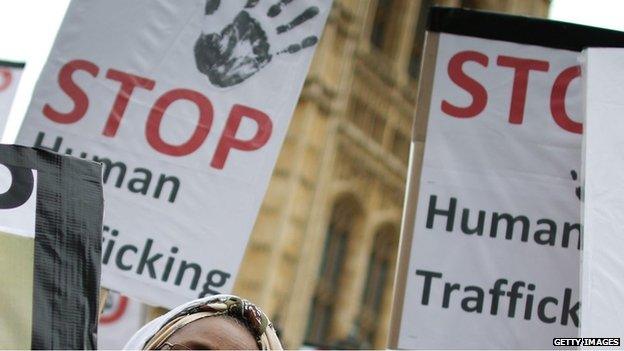The women who come to the UK as brides but end up as slaves
- Published
Shazia says she was beaten and forced to do chores
"I used to think they would kill me and no-one would ever find out."
Shazia was married at 15 in Pakistan and came to Britain with her husband when she was 21.
He began beating her on the third night in the country and she quickly became a slave to his family.
"All day I would do housework, I would massage my mother-in-law, I would wash her feet; they made a timetable for me, I had no life of my own."
BBC Newsnight has heard many stories, like Shazia's, of wives enslaved in the UK by their British-born husbands and in-laws.
'Burned with iron'
Campaigners say such cases are just the tip of the iceberg, but there are believed to have been only two successful prosecutions.
One lawyer in Newcastle-upon-Tyne, who has helped numerous women escape violent homes, says many victims are discouraged from taking legal action by the police.
We focused our investigation on north-east England, but I was told I could have found such cases in any part of the country.
The women were still so scared of their husbands and in-laws that they asked us not to use their real names.
When Shazia's beatings started, her in-laws did nothing to stop them.
'Fazana' tells her story.
"He was hitting me a lot. In the next room was my brother-in-law and his wife," she says.
"They heard the noise, they came outside but they didn't step forward to try and separate us.
"They were just quiet, you know like when a person watches a show."
She says scars on her face were caused by her husband's brutality and she was whipped, burned with an iron and battered with a sewing machine.
Shazia had learned to sew in Pakistan.
She describes how her mother-in-law had her making up to eight suits a day for paying customers but kept all the money for herself.
'Slap her face'
"I would use the washing powder to wash my hair, they wouldn't provide toothpaste," Shazia says.
"Whatever money they had, they would keep, I didn't have anything."
Another woman, Fazana, who also came to the UK from Pakistan, tells a similar story.
"He said to his mother: 'Mummy, you know we just bring her here for our work, she's our slave'."
Fazana toiled in the family shop from 9am until 9pm unpaid.
She also worked for many hours each day doing all the housework and cooking.
"His mother said all the time 'If she does something wrong, slap her face'," Fazana says.
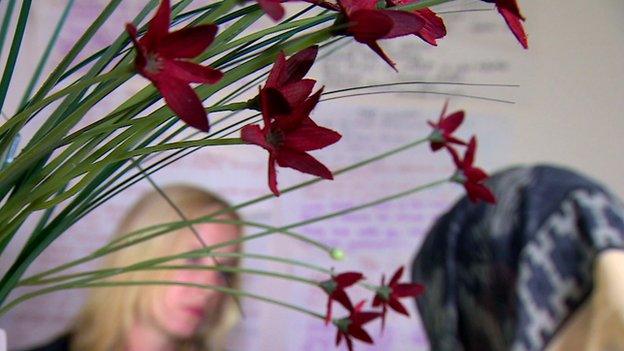
Shazia received regular beatings from her husband
"He said to me 'you are prostitute' and 'you are slag' and 'bitch', all the time, 'you come from gutter'."
She also says she was forced to have an abortion against her will.
Both women say they were trapped.
They couldn't speak English, were never allowed out alone and were regularly threatened with being sent back to Pakistan by their abusers.
That would have brought shame on them and their families back home.
Soraya Azam, from the Awaaz Honour Crimes Project, a charity that helps women escape violence, says such women are required to be "domestic slaves by day and sex slaves in the night".
'Flat broken into'
She says they often marry relatives who are British citizens and have been chosen as brides because abusive families believe they will put up with treatment that British women will not.
Both Shazia and Fazana eventually escaped from their husbands, but, Soraya says, Shazia has suffered intimidation three years on.
"[Her husband] broke into her flat. He wanted her to know 'I know where you are and you are never going to get away from me'," Soraya says.
The number of partner or spouse visas granted by the Home Office to people from South Asian countries fell from 14,876 in 2010 to 8,887 last year, after the government introduced a requirement that applicants must have an available income of more than £18,000 a year.
However, campaigners say that women to be used as domestic slaves don't just arrive on spouse visas, but also as students or other temporary entrants to the UK.
There's no way of knowing just how many of those women experience slavery.
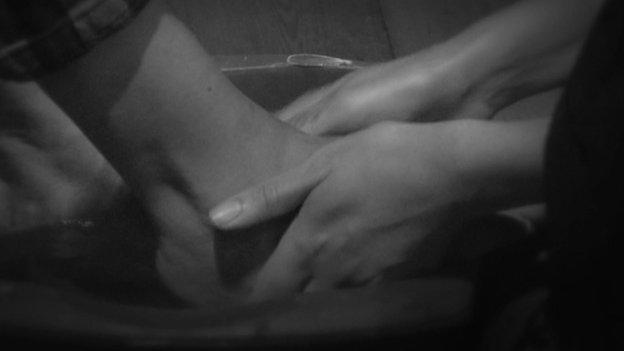
Shazia says she was made to wash her family members' feet
Cris McCurley, a lawyer who specialises in slavery cases for Ben Hoare Bell, says she alone sees about 120 cases a year.
She says the police can be part of the problem when it comes to examining why there have been so few prosecutions.
"I hear from many women who are actively dissuaded from taking a case by the police," she says.
She says women have been told that their husbands will be the ones with all the supporting witnesses and that it is easier to escape an abusive family by just disappearing and not prosecuting.
Faiza came to the UK from North Africa, where she'd had her own business.
But once married, her husband and his family locked her in the house, monitored her every move and worked her from morning until night.
'Nobody listened'
She eventually went to the police.
Faiza says the policewoman gave her five minutes to explain before saying: "We cannot do anything, you have to go to a solicitor."
"From that, I lost trust, so I didn't want to go back to the police station. Nobody listened, nobody believed, nobody want to help me."
Cris McCurley says there are parallels between what's happening to these women and what happened to the young girls abused by members of the Asian community in places like Rotherham.
"White professionals dealing with different communities are frightened of getting it wrong, of being racist, being insensitive," she says.
Add to that community silence and the issue stays hidden.
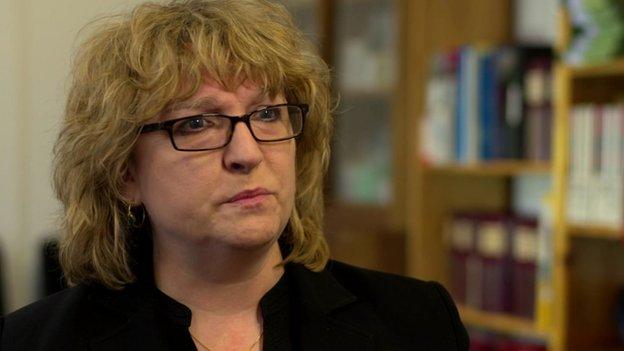
Cris McCurley says she deals with more than 100 cases of suspected slavery each year
The Association of Chief Police Officers (Acpo) says it takes "very seriously" the issues raised by Newsnight.
In a statement, it said: "While we cannot comment on specific cases, we do have very high expectations of officers' conduct when dealing with victims of either domestic abuse or modern slavery.
"If you have been suffering in silence as a result of slavery or domestic abuse, we understand how terrifying the experience can be.
"Let us reassure you that you can come to the police with complete confidence that we will do everything in our power to protect you and secure justice for you."
Watch Katie's report in full on BBC iPlayer.
- Published30 September 2014
- Published31 July 2014
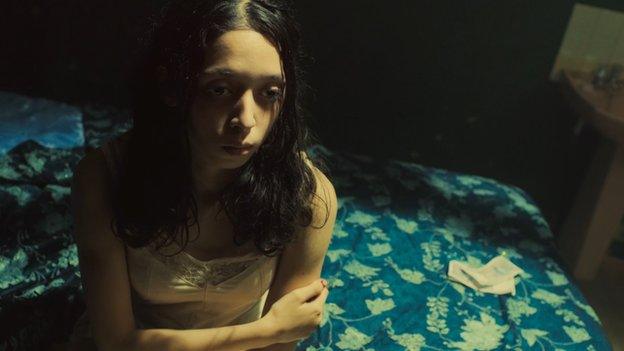
- Published4 June 2014
